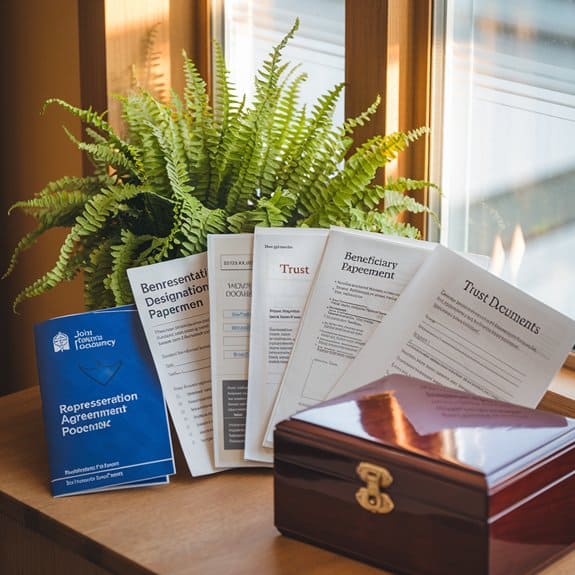
Beyond wills, you can protect your BC estate through joint tenancy agreements, designated beneficiaries for insurance and investments, and specialized trusts. These alternatives bypass probate fees (saving 1.4% on estates over $50,000), shield assets from wills variation claims, and provide immediate fund access to beneficiaries. Each option requires proper documentation and consideration of tax implications. The right strategy depends on your unique family situation and financial goals.
Joint Tenancies: Automatic Transfer of Assets
When planning your estate in British Columbia, joint tenancies offer one of the most straightforward ways to transfer assets upon death. Assets held in joint tenancy pass automatically to the surviving joint tenant, bypassing probate fees and expenses typically associated with estate administration.
While this arrangement works well between spouses, complications can arise when establishing joint tenancy with children or non-spouses. The Supreme Court case Pecore v. Pecore (2007) established that you should sign a “Joint Tenancy Agreement” confirming your intent for the beneficial transfer of assets. Without this documentation, the automatic transfer is not guaranteed.
Be aware that adding a child to your property title can expose assets to their creditors. A properly drafted agreement can specify that the child has no beneficial interest until your death.
Designated Beneficiaries for Insurance and Investments
Beyond establishing joint tenancies, you will find significant advantages in designating specific beneficiaries for your life insurance policies and investment accounts like RRSPs and TFSAs.
These designated assets transfer directly to your named beneficiaries, completely bypassing your estate.
This approach offers multiple benefits: you will avoid probate fees and any potential wills variation claims while ensuring your assets are not subject to creditors’ claims against your estate.
It is particularly valuable when planning for your spouse’s lifetime needs while ensuring remaining assets eventually pass to your children.
With life insurance policies, you can structure the designation to provide for your spouse during their lifetime, with any remaining proceeds transferring to your children after your spouse’s death – offering both immediate protection and long-term planning in one solution.
Alter-Ego and Joint Spousal Trusts
Trusts represent one of the most versatile tools in your BC estate planning toolkit, particularly alter-ego and joint spousal trusts.
These specialized vehicles function as separate legal entities that hold your assets outside your estate, effectively bypassing probate fees and potential wills variation claims.
With an alter-ego trust, you will transfer assets while retaining all income and capital access during your lifetime.
An alter-ego trust offers the perfect balance—transferring assets while maintaining complete income and capital control throughout your life.
Joint spousal trusts work similarly but extend benefits to both you and your spouse until the surviving spouse’s death.
Both options offer tax-sheltered transfers and protect against discretionary distribution risks that might occur with other planning methods.
While these trusts provide significant advantages, they require professional setup due to their complexity and associated costs.
You will need experienced legal and potentially accounting guidance to determine if these sophisticated planning tools align with your specific circumstances.
The Pecore Case: Legal Implications for Joint Ownership
In a landmark decision that fundamentally reshaped how joint accounts are viewed in Canadian estate law, the Supreme Court of Canada’s ruling in Pecore v. Pecore (2007) established a critical presumption.
When a parent adds an adult child to their account as a joint owner, the court now presumes this was done for estate planning purposes only, not as a gift during the parent’s lifetime.
This means if you are adding a child to your accounts, they will not automatically receive beneficial ownership unless you create a signed Joint Tenancy Agreement stating your intention.
Without such documentation, the assets may be treated as part of your estate after death, potentially facing claims from other beneficiaries.
This ruling protects against unintended asset distribution while highlighting the importance of clearly documenting your intentions.
Avoiding Probate Fees Through Strategic Asset Planning
While the Pecore case highlights the importance of clear documentation in joint ownership, strategic planning of your assets can help you avoid probate fees entirely.
Clear documentation in joint ownership matters, but strategic asset planning can eliminate probate fees completely.
By structuring your estate properly, you will save your beneficiaries both time and money when distributing your assets.
Consider these fee-avoiding strategies:
- Designate specific beneficiaries on your RRSPs, TFSAs, and life insurance policies to guarantee these assets pass directly to recipients outside your estate.
- Create trusts like alter-ego or joint spousal trusts that function as separate legal entities, shielding assets from probate while maintaining your control during your lifetime.
- Establish properly documented joint tenancy arrangements for real property and accounts, allowing automatic transfer to surviving owners without court involvement.
Protecting Assets From Creditors’ Claims
Creditors pose a significant threat to your estate’s value after death, potentially leaving your loved ones with less than you intended. By utilizing strategic estate planning tools, you can shield assets from these claims and maximize what passes to beneficiaries.
Designated assets like life insurance policies and registered accounts (RRSPs, TFSAs) provide excellent protection since proceeds flow directly to named beneficiaries outside your estate.
Trusts offer another layer of protection as these assets legally separate from your personal holdings, placing them beyond creditors‘ reach.
Joint tenancy arrangements can also help, particularly when accompanied by proper documentation like Joint Tenancy Agreements. These specify that your joint tenant (often a child) has no beneficial interest until your death, preventing their creditors from making claims against the property during your lifetime.
Trust Structures for Complex Family Situations
When families face complex situations like blended households, disabled dependents, or potential inheritance disputes, trust structures offer tailored solutions that standard wills cannot provide.
These legal arrangements allow you to establish specific terms for asset distribution while providing protection against common challenges.
Consider these specialized trust options:
- Spendthrift trusts that disperse assets gradually to beneficiaries with financial management difficulties, protecting inheritance from impulsive spending.
- Special needs trusts designed for disabled dependents that preserve their eligibility for government benefits while providing supplementary support.
- Discretionary trusts giving trustees flexibility to distribute assets based on changing family circumstances, particularly valuable for complex blended families with competing interests.
You will need professional guidance to determine which trust structure best addresses your family’s unique situation while minimizing tax implications.
Tax Implications of Non-Will Estate Planning Options
Although estate planning alternatives to wills offer significant advantages in avoiding probate fees and streamlining asset transfers, each option carries distinct tax implications you should not overlook.
Joint tenancies can trigger immediate capital gains tax when adding someone to a title if they do not qualify for principal residence exemptions.
Trusts, while providing excellent probate avoidance, require careful structuring—alter-ego and joint spousal trusts defer capital gains until death, but other trusts may trigger immediate taxation upon asset transfer.
Designated assets like RRSPs pass directly to beneficiaries but still count as income on your final tax return, potentially pushing your estate into higher tax brackets.
Insurance proceeds, however, generally transfer tax-free to named beneficiaries, making them particularly tax-efficient vehicles for wealth transfer.
Joint Tenancy Agreements: Securing Your Intentions
Since joint tenancies automatically transfer property to the surviving tenant, it is crucial to document your true intentions with a proper Joint Tenancy Agreement, especially when adding children or non-spouses to your property titles.
Following the Supreme Court of Canada’s Pecore v. Pecore ruling, these agreements clarify whether you intend a genuine beneficial transfer or merely administrative convenience.
A well-drafted Joint Tenancy Agreement can:
- Explicitly state whether the added person has a beneficial interest now or only upon your death
- Protect your assets from potential claims by the joint tenant’s creditors
- Provide clear evidence of your intentions that would stand up in court if challenged
Without this documentation, your assets could be distributed contrary to your wishes, potentially causing family conflict and financial hardship.
When to Consult Professionals for Estate Planning
Because estate planning involves complex legal and tax implications, consulting with professionals becomes essential for guaranteeing your plan’s effectiveness and legality.
At Vest Estate Law, our team specializes exclusively in wills and estates law across Alberta and BC, providing you with focused expertise when steering through alternatives to traditional wills.
You should consult estate professionals when setting up trusts, drafting joint tenancy agreements, or determining the most tax-efficient beneficiary designations for your assets.
Our legal advisors can help you understand the implications of each option, particularly in complex family situations or when significant assets are involved.
We will guarantee your estate plan aligns with current BC laws while protecting your assets from probate fees and potential claims.
Should disputes arise, our experience in estate litigation provides added protection for your legacy.
Frequently Asked Questions
Can I Use Multiple Methods Simultaneously for Different Estate Assets?
Yes, you can use multiple methods simultaneously. You will optimize your estate plan by applying joint tenancies for property, beneficiary designations for insurance, and trusts for complex assets requiring special management.
How Do Estate Planning Alternatives Affect Blended Family Dynamics?
Estate planning alternatives can greatly impact blended families. You will need clear joint tenancy agreements, specific beneficiary designations, and well-structured trusts to prevent conflicts between your current spouse and children from previous relationships.
What Happens if a Joint Tenant Becomes Mentally Incapacitated?
If your joint tenant becomes mentally incapacitated, you will need a power of solicitor to manage their share. Without one, you will face court applications for authority over joint assets.
Can Digital Assets Be Included in Non-Will Estate Planning?
Yes, you can include digital assets in your non-will estate planning through designated beneficiaries, joint accounts, trusts, or digital asset management services that transfer ownership upon your death.
Are There Age Restrictions for Beneficiaries of Trusts?
Trusts do not have age restrictions for beneficiaries, but you will need to establish provisions for minors. You can specify distribution ages or appoint trustees to manage assets until beneficiaries reach maturity.

We serve the entire province of BC. Our experienced paralegals can meet with you in Vancouver and throughout the Lower Mainland, making it easier for you to get the assistance that you need. We also have an interior office in Kamloops. That said, our lawyers have the infrastructure to work with any of our clients virtually — even in the furthest regions of British Columbia.
Call (604) 256-7152 [toll free 1 (877) 415-1484] to get routed to the best representative to serve you or contact us online to schedule an appointment.
We also have a dedicated intake form to help you get the ball rolling. Our intake team will review your specific case and advise you on the next steps to take and what to expect moving forward.
Our offices are generally open 8:30 a.m.—5:00 p.m., Mon—Fri.
Vest Estate Law is dedicated to providing you with practical and innovative advice in estate administration, estate planning, and estate disputes, do not hesitate to reach out and one of our knowledgeable staff will respond promptly to arrange a consultation that meets your needs.


Nathaniel Mcghie
WILLS and ESTATES LAWYER
Nathaniel Mcghie is a lawyer in our Vancouver office. Nathaniel is experienced in representing clients and providing legal advice on estate law matters. He is sought after by both individuals and corporations for legal representation.

